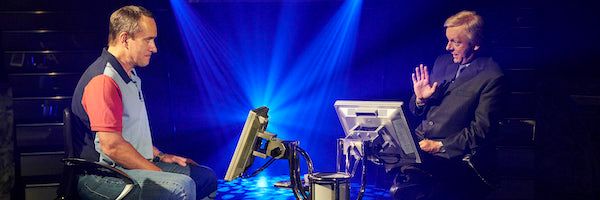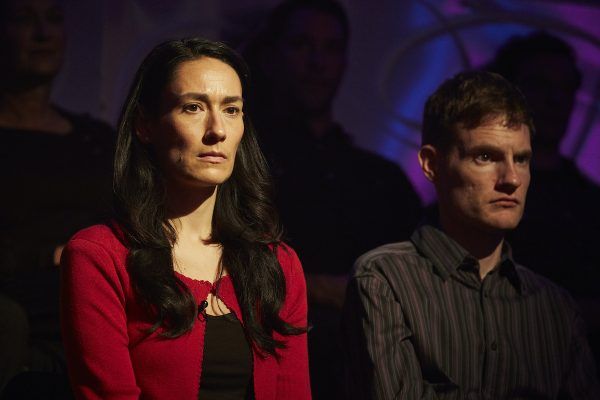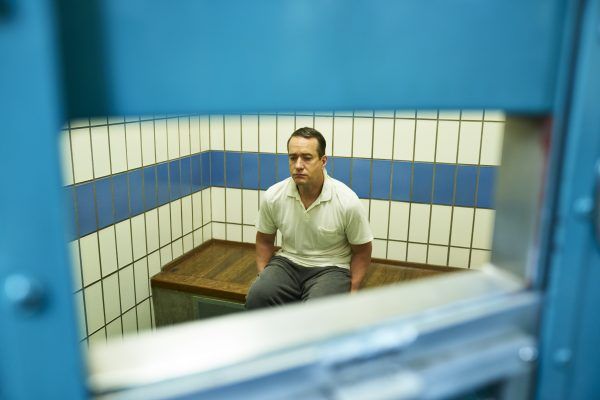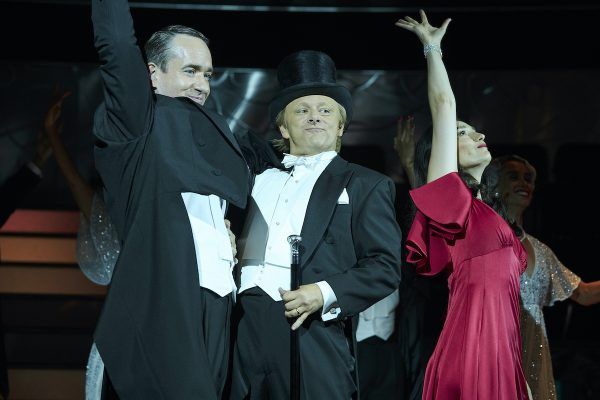The lights fade down to an ominously dark, bluish hue. The score bombards you with its Hans Zimmer-esque brass and electronic drums. In front of you, a seasoned television veteran calmly asking you questions while subtly negging you all the way. Who Wants to Be a Millionaire?, that game show phenomenon from the late '90s and early 2000s, used every tool at its disposal to put the pressure on every single contestant who dared challenge the hot seat. But one man, despite all of this pressure, cheated the slick television system and just nearly won. Or...did he? If he did, why? If he didn't, why are we all so fascinated by it? This story and these questions are undoubtedly irresistible fodder for human drama. It's just such a pity that Quiz, the AMC/ITV three-episode true crime miniseries devoted to examining it all, doesn't seem interested in any of it beyond its superficial trappings.
Who Wants to Be a Millionaire?, if you didn't know, was originally a British invention from Paul Smith (Mark Bonnar) and David Briggs (Elliot Levey). And when it debuted on ITV in 1998, it took England by storm, becoming a nationwide phenomenon. Hosted by accomplished TV presenter Chris Tarrant (Michael Sheen, a treasure), the game was deceptively simple: Answer multiple choice questions in as much time as you need, get up to a million pounds using only your wits and three lifelines, go home a newly rich human.
But for Diana Ingram (Sian Clifford) and especially her brother Adrian Pollock (Trystan Gravelle), who've always loved quizzes, it's more than a simple piece of entertainment. They take it upon themselves to hack the system, getting involved in an underground group literally called "The Syndicate" to figure out all kinds of tips and tricks that toe the line of "cheating." But when they convince Diana's husband, Army Major Charles Ingram (Matthew Macfadyen), to appear as a contestant on the show, that line of "cheating" is crossed over and then some. Ingram becomes the first person in the show's history to win the million-pound prize -- but did he cheat to win?
Episode 2 of the three-parter largely stages Ingram's fateful episode in real-time, while including imagined vantage points from the crew as they realize what's going on in front of them. It's here where the show's source material — a play of the same name by James Graham, who adapted his own work for this show — serves the program to great success. With slick-but-not-showy direction from Stephen Frears, Ingram's journey through the Millionaire questions becomes a gripping thrill-ride of audacious obviousness, face-smacking obliviousness, and some of the best use of "subtle sound mixing" as a tool I've ever seen.
You see, Ingram and his wife (allegedly) cheated at the game by using a series of well-timed coughs supplied by fellow Syndicate member Tecwen Whittock (Michael Jibson), who's sitting in the Fastest Finger seat. As Ingram slowly states each potential answer, placing his hand suspiciously over his ear, guessing wildly at the wrong one, we barely hear one of these coughs on the right one. And suddenly, we watch in incredulous agony as Ingram tangoes his way through some invented logic to the right answer, surprising even Tarrant. Frears and Graham go on to raise the stakes, implicating Diana heavily in the process, while still keeping the "watching one intense event happen exactly as it happened" pleasures that come from theatre fully intact. It's easily the show's finest hour.
But as much as I love a good procedural howdunit thriller, and as much as I love the logline of "a hapless Army Major cheated the most popular game show out of a million quid," I need something more. I need "whydunit." Graham and Frears' work, on some level, understands that this "why" is needed in any story to really say something. But Quiz throws so many ingredients into the stew before quickly moving on to the next one, that none of them taste particularly rich. As such, what we know about these characters (who are, I will remind, all real people) shifts and changes abruptly with no attempt at connecting the wires. Characters often tell us what their deal is — Adrian loves quizzes more than anything, Charles hates quizzes more than anything, Paul's show is his baby — but the pool is shallow, and results in far too many audience belly flops.
The character of Charles, especially, demands more psychological examination from his dramatists. Macfadyen plays him wonderfully, the best performance of the show. But if we know anything about him, we know that quizzes stress him the hell out and he's bad at them. So why does he agree to go on the show? Why does he agree to such a brazen cheating scandal? The Charles invented for imagined scenes feels like a completely different person than the Charles we see in the Millionaire Hot Seat, and no attempt is made to explain the jarring disconnect. I can only imagine what a more satisfying story this would've been if we had known why.
This is all especially a bummer because the show tells us, from literal frame one (a quote about the purpose of art as it relates to truth from Pablo Picasso), that it is interested in examining the big whys behind this specific case. Big swings are made by Frears and Graham. Characters break the fourth wall and turn to the camera. A surreal dance sequence punctuates the third episode. Many pontifications on the corrupt collision between "televised entertainment" and "real-life justice" are made. A final moment involving Tarrant and Charles indicts Charles (and, uh, "us"?) with aggressive pointedness. And all of these choices, which could sing so sweetly in an alternate prestige TV version of this same story, fall the heck flat. Because Quiz is so unrelentingly obvious and superficial in its psychologies and criminal depictions, these attempts at nuance don't feel in any way organic. They feel like a bucket of paint, splattered exactly next to a blank wooden table — yes, I suppose some splotches have technically colored the table, but now the table is still blank and you've made a mess. By the time the Ingrams' defense lawyer Sonia Woodley (Helen McCrory delivering excellent work) waxes meta-philosophically about the inherent flimsiness of memories and the idea that the author inherently frames our perspectives of stories (delivered at least partially straight to camera), it is both too much and too late.
Would Quiz have worked better with more episodes? A focus on plot-driven ambiguity from moment one? A deeper, sharper attempt to find the psychological, unknowable truths behind this very public case? Sadly, these are questions we'll never know the answers to. All we have is what's on the screen in front of us. And while we get bombarded with lights fading, score blaring, filmmaking tricks thrown at us willy-nilly, we yearn for a fundamental lesson of television storytelling, delivered explicitly within the text by the Millionaire producers. We don't watch these kinds of shows for the spectacle. We watch for the simplicity. A person, with as much time as needed, being faced with questions the don't know the answer to -- and the captivating struggle that occurs when they try to answer them anyway.
Grade: C
Quiz begins airing on AMC May 31.
For more about the show, here's our interview with Michael Sheen.




